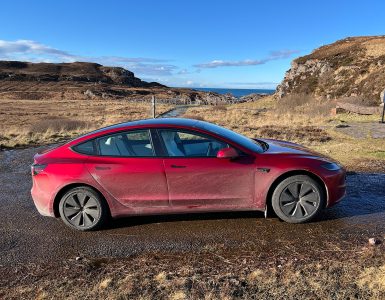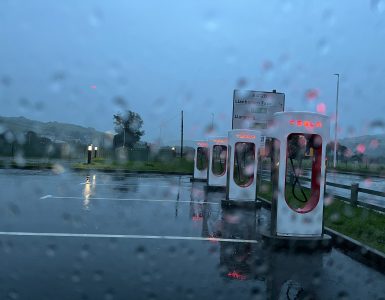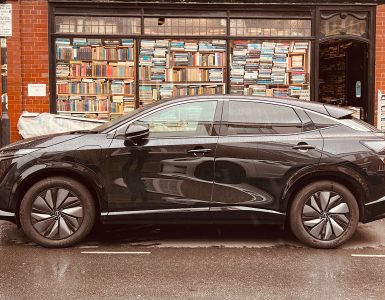Imagine you’re on a trip down a UK motorway and making good progress and then up pop those signs
ROADWORKS – AVERAGE SPEED CAMERAS – 50MPH
There are 2 reactions to these depending on your outlook to driving
- Frustration at every mile it continues combined with anger if you don’t actually see anyone at work on the cause of your frustration or
- the more relaxed approach. After all average speed check road works generally mean everyone with legal number plates is doing the same speed with no incentive even for aggressive drivers to tailgate or switch lanes.
So why should electric car owners be especially grateful about long sections of motorway road works?
Well efficiency matters a lot with EV’s (Electric Vehicles). It doesn’t just cost more money to run an EV that’s less efficient. For example an Audi e-tron 55 carries a bigger, heavier and more expensive battery but is so inefficient that lighter more efficient EVs like a Hyundai Kona and Tesla Model 3 with much smaller batteries can go far further between stops and spend less time charging up on average chargers.
So how do road works help? Well you know how new owners complain their EV’s don’t deliver the official EU WLTP range stats promised. On average most EV’s on the road deliver about 20% under the official range on a year round basis. Well every mile at 50mph gives you a range boost, and it’s not small!
On my London to Scotland EV Day trip I had the chance to check on the same journey what the difference was on my Performance stealth Tesla Model 3 ( a performance that looks like a long range model) based on an estimated 74.5 kWh usable battery.
| Speed | Wh/mile | Miles per kWh | Range |
|---|---|---|---|
| 80 mph est | 285 | 3.5 | 261 miles |
| 70 mph | 260 | 3.84 | 286 miles |
| 60 mph | 225 | 4.44 | 331 miles |
| 50 mph | 176 | 5.68 | 423 miles |
- My 2019 Model 3 is currently averaging about 283 Wh/ mile which is 3.53 miles per kWh and an average range of 263 miles.
- The standard “typical” range shown by Tesla is 250Wh/mile or 4 miles per kWh which would give 298 mile range.
Winter temperatures and gridlocked traffic jams can cut miles per kWh to 2.85 or worse if you are using car systems like heating while not moving.
Real World Test M4 Motorway- 5th June 2021
So as with any test it’s important to establish the parameters
- Weather was dry, sunny and 18-23c
- The test figures included several miles in SW London (largely a 20mph zone) to join the M4 and a motorway only set of “trip” figures
- Start was with 100% charge and the “typical” Tesla range showing 298 miles
- Air con was on and set to 20c
- Sound system was on for nearly all the journey
- Motorway sections were mostly at 45-50 mph in 50mph zone and 55mph with the traffic in the slow lane where 60mph or 70mph limits applied.
So this was as normal as possible and not hypermiling in unrealistic conditions. The aim was to prove whether the road works range boost could give this Model 3 over 400 miles of range. The trip involved a quick stop (but no charging) at Chieveley Moto services near Newbury. There are 2 sets of stats
- From Putney to Heston services East bound on the return leg (Since last charge) 100.7 miles
- Heston services outbound to Heston return ie Motorway only (Trip) 89.7 miles
- The “since last charge” stat is pretty easy as the distance of 100.7 miles used a quarter (25%) of the battery which equates to a range of 403 miles. The car used 18kWh for the 100 miles and averaged 177Wh per mile or 5.64 miles per kW/hour. Curiously the last 30 miles before Heston was the most efficient of all at 158Wh/mile or 6.32 miles per kW/h. So when I stopped at Heston after doing 100.7 miles the car was projecting another 347 miles range (enough to reach the Scottish border from London!) or an equivalent a full battery range of 447.7 miles!
- So how about the motorway only “trip” stat. This was used to provide motorway road works only without the London traffic bit. In the end the London effect just outside of rush hour wasn’t that great so the trip energy use was only 5kW/h lower over the 89 miles at 172Wh/ mile or 5.81 miles per kW/h equivalent to 433 miles of range for a full battery!

Conclusion
So next time your motorway speed is limited to 50mph, remember that, whatever EV you drive, Highways England is giving your car a unique super power. What would you pay for a button that boosted your battery range by 51%.. for no extra money and no extra charge time. The exact numbers will vary with different EVs but next time you enter some road works whether they last 2 miles or 50 miles, they’ve given you a free gift and helped keep the workforce safe as well!
Even if 50 mph zones thankfully don’t usually last for your entire journey that extra range will get you a little closer to your destination. In fact we’ll probably find out one day that motorway roadworks are where the EU go to measure range & MPG figures!






